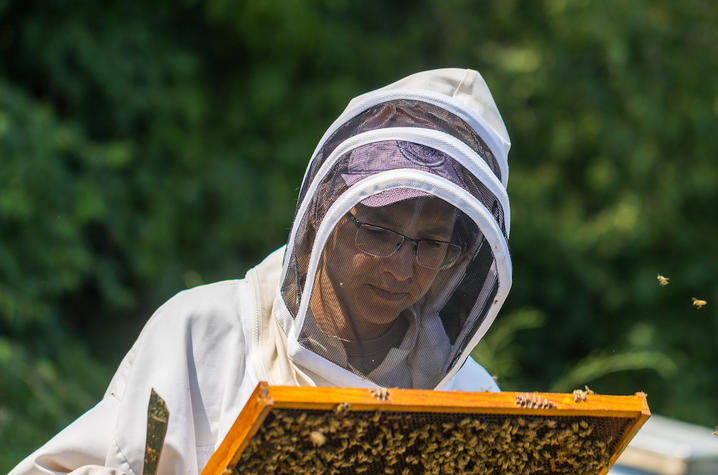UK researcher’s work understanding honey bees receives prestigious grant

One University of Kentucky researcher has earned a prestigious award to advance her studies on how environmental changes impact honey bees.
Clare Rittschof, Ph.D., an associate professor of entomology and one of The Bill Gatton Foundation Distinguished Professors in the UK Martin-Gatton College of Agriculture, Food and Environment, is on the team selected for funding in the first year of the Scialog: Neurobiology and Changing Ecosystems initiative.
This effort is sponsored by Research Corporation for Science Advancement, the Paul G. Allen Frontiers Group, the Paul G. Allen Family Foundation, the Frederick Gardner Cottrell Foundation and The Kavli Foundation.
The $66,000 award supports the project “Bee-ing aware: Monitoring honey bee larval nutrition, chemical exposure and neurobiological effects.”
Rittschof’s project aims to uncover how nutrition and chemical exposures during the crucial larval stage affect honey bee health and survival.
“While honey bees play a vital role in global food production, colony mortality rates are historically high and unsustainable in the U.S. Many factors like pollution and poor nutrition contribute to colony losses, but their impacts on early life stages in the honey bee are virtually unknown,” Rittschof said.
Little is known about what young bees consume, and whether diet differences at this life stage impact the ability to thrive later in life.
To address this gap, Rittschof’s team will use advanced, high-throughput lab techniques to analyze the processed, milk-like jelly adult bees feed to larvae, identifying key nutrients, plant chemicals and pollutants present across different hives.
Ultimately, their goal is to develop microsensors that can easily monitor critical dietary components at different locations and at different times during development.
“The larval stage of the honey bee is the feeding stage, so we need to understand the sources of variation in this diet in order to support pollinator health and food security. Hopefully our efforts will make it easier to collect these critical data,” Rittschof said.
The entomology professor is working with the University of Toronto Scarborough’s Ina Anreiter and American University’s Alexander Zestos.
Six cross-disciplinary teams in the U.S. and Canada have won funding for the first year of this initiative.
About Scialog
Scialog is short for science + dialog. Created in 2010 by RCSA, the Scialog program aims to accelerate breakthroughs by building a creative network of scientists that crosses disciplinary silos and by stimulating intensive conversation around a scientific theme of global importance.
University of Kentucky alum and former trustee Carol Martin “Bill” Gatton bestowed a transformational $100 million gift to the college through The Bill Gatton Foundation. It is the largest gift to the university in its history.
Four Pillars of The Bill Gatton Foundation’s gift are (1) Scholarships and other initiatives for Student Success, (2) Companion Animal Program, (3) 21st Century Capital Projects and New Initiatives Fund and (4) Faculty Research and Innovation/Research Challenge Trust Fund Program.

